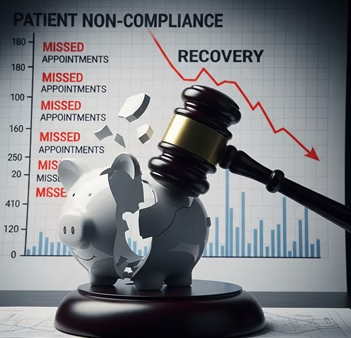For a patient navigating a personal injury claim, the costs of failing to follow their doctor’s orders are not measured in national statistics, but in the direct and often devastating devaluation of their legal case. While the healthcare system grapples with the broad economic impact of non-compliance, for the individual plaintiff, the consequences are immediate, personal, and financially damaging.
When a patient in a personal injury case becomes non-compliant—by missing physical therapy, delaying specialist visits, or failing to fill prescriptions—they are inadvertently creating a new, more potent defense for the insurance company and its lawyers. The “costs” of this non-compliance manifest in several critical ways that can cripple an otherwise valid claim.
1. The Cost of Reduced Settlement Offers
This is the most direct and tangible cost. Insurance adjusters and defense attorneys meticulously scrutinize medical records for any sign of non-adherence. Each missed appointment or gap in treatment becomes a justification for a significantly lower settlement offer. The adjuster’s argument is simple and effective: “If the claimant was truly in as much pain as they say, they would have gone to their appointments. Their failure to do so proves the injury is not severe, and we will not pay for damages they allowed to worsen.” An initial case valuation of $100,000 can be swiftly reduced to $50,000 or less based on a pattern of non-compliance.
2. The Cost of Destroyed Credibility
In any legal case, credibility is currency. A non-compliant plaintiff gives the defense a powerful tool to destroy their credibility in front of a judge or jury. During a deposition or at trial, a defense attorney will methodically list every missed appointment and ask pointed questions:
- “You claim you have debilitating back pain, yet you missed six of your ten scheduled physical therapy sessions in May. Can you explain that?”
- “Your doctor prescribed this medication for you on July 1st, but you didn’t fill it until July 15th. Was the pain not significant during those two weeks?”
This line of questioning paints the plaintiff as either untruthful about their injuries or negligent in their own recovery. This loss of credibility is priceless and often proves fatal to a case.
3. The Cost of a Weakened Legal Argument (Failure to Mitigate)
Legally, every plaintiff has a “duty to mitigate their damages,” meaning they must take reasonable steps to minimize the harm they have suffered. Non-compliance is a direct breach of this duty. This shifts the legal argument from the defendant’s initial negligence to the plaintiff’s subsequent negligence. The defense can argue that a significant portion of the plaintiff’s ongoing pain, suffering, and medical bills are not the fault of the accident, but the result of the plaintiff’s own failure to follow medical advice. This “cost” is measured in the erosion of the attorney’s ability to prove causation, a cornerstone of any personal injury claim.
4. The Cost of Jeopardizing Medical Support
A treating physician’s testimony is crucial for linking an injury to an accident. However, when a patient is non-compliant, it puts the doctor in an impossible position. If asked under oath what caused the patient’s poor outcome or need for future care, the doctor must ethically acknowledge that the patient’s failure to follow their advice was a contributing factor. This “friendly” expert witness is now providing testimony that helps the defense, a devastating blow from which a case rarely recovers.
In the context of a Shreveport personal injury claim, the cost of non-compliance is a cascade of losses. It begins with a lower offer, progresses to a loss of credibility, cripples the underlying legal arguments, and can ultimately result in a lost case or a settlement that is a fraction of what could have been recovered. For the injured plaintiff, the message from the legal system is clear: the cost of not following your doctor’s advice is a price you cannot afford to pay.
Matt Rhodes is the author of “The Clinician’s Handbook of Personal Injury Practice” and Founder and CEO of PathLogic.
